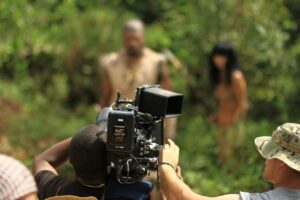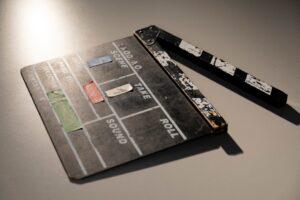‘With stunts there’s a lot of moving parts’: Overseeing safety in the entertainment industry
Dave Downing, from the entertainment safety consultant, Safe Elephant, on adapting to the unpredictable creative demands of movie directors.
 From working within regulation to ensure a car is flipped safely to liaising with special effects on explosions, no two days are the same for Dave Downing and his team at Safe Elephant, an entertainment safety consultancy that straddles theatre, TV and film.
From working within regulation to ensure a car is flipped safely to liaising with special effects on explosions, no two days are the same for Dave Downing and his team at Safe Elephant, an entertainment safety consultancy that straddles theatre, TV and film.
On a film set, communicating up isn’t always to an Executive Board, but rather a movie director with a distinct, vision with no room for compromise. So how do you go about blending creativity with risk in such an environment? “We’re dealing with people who have won Oscars,” Downing says, “so it’s about understanding how their creative minds work”
But let’s start at the beginning and find out how Safe Elephant was born and how he got to flipping those cars and managing explosions on film sets.
SHP: What’s the story behind Safe Elephant?
Dave Downing (DD): I started in outdoor events, festivals doing crew – so the scaffolding, the stages, the fencing, the forklift driving.
I did my NEBOSH and got my first proper job as a [safety] manager in 2015 when CDM [Construction, Design and Management] started to become a big thing for the entertainment industry.
I moved from outdoor festival type events into more bespoke builds, fairs and exhibitions and then, after several years, into film and TV.
My business partner [at Safe Elephant] invited me to come on board with his company and we did TV commercials, dramas, live game shows… it was a real baptism of fire.
But when Covid hit, health and safety advisors became experts [in a field] we never thought we would be experts in. We got a lot of shows up and running in weird conditions. We helped with paperwork, working [at safe distances], masks…After that we were burnt out so my business partner and I both left our respective jobs and started freelancing.
Then we started thinking we could offer clients more of a package service. [Safe Elephant was born in 2021] and since then it’s been… interesting.
We’re moving quite slowly – we don’t want to get too big or take on [too much] work. But the clients we work with are always happy with our service and we’ve worked on some really interesting projects.
SHP: How does working in the entertainment sector reflect safety in other sectors? If at all?
DD: As much as we understand that legislation and [safe] working practices are very black and white, we have to approach our job in the creative industry very differently to how we’ve done it before. How do we adapt and work with the creative process to make sure that everything is above board from a legislative side and with working practices?
Because if we’ve got a shoot going on, we plan as much as we can but we’re at the mercy of one guy directing this whole project. Our world is very planning [orientated] but the creative director might one morning have a completely different idea, which means that we’ve got to change everything on a dime.
The mentality you see with many safety officers is: “It’s my way or the highway”, but I’ll get fired before the director. So it’s a change of mentality: it’s never a “no”; it’s a “let’s consider doing it this way”. It’s about getting buy-in from the people at the top.

CREDIT: Harald Müller/Unsplash
SHP: In what other ways is delivering safety services in the entertainment industry challenging?
DD: No two days are ever the same and anything could happen. We go from like period dramas where everything has to look perfect through to fantasy [productions] where we’re dealing with stuff that doesn’t exist, so the variety is always a good challenge.
The hardest thing I’ve found is people coming into the industry and saying: “What do you mean, I have to change where I’m going tomorrow?” Or “What do you mean, we’re not doing what we planned?” But that’s just going to happen. We have to accept it. I just had a phone call with someone saying that we’re moving location.
We’ve got staff members who [originally] thought: “Oh, I never thought that this would even be a job”. Our most recent employee was just walking around an event with a masters in risk management that they didn’t know what to do with.
SHP: How do you plan for things going wrong?
DD: Things go wrong all the time. We are working with unknowns.
There’s regulation on what happens when you flip a car: what’s the velocity, what’s the angle and how it’s going to react, or even if it’s going to get a flat. The explosive side of it.
Say the SFX [special effects] team worked out that an explosion needs a [one] metre exclusion zone around it – we might say “let’s just make that a bit bigger and get the crew [numbers] down to the absolute minimum needed. Let’s make that a remote camera head so the camera operator doesn’t need to be there”.
It’s about putting in contingencies in case something goes wrong.
SHP: Is there a particular project or aspect of your job that has been particularly satisfying?
DD: When a big stunt comes together, and we’ve planned it as much as we can and built in those contingencies for anything that could go wrong.
With stunts there’s a lot of moving parts. If you have a car chase with an explosion and then a fight scene, your vehicle team is managing the vehicles; the drivers are figuring out where they can stop and start; the SFX team are working on the explosions, the rigs, the charges, the clearance areas; and the stunt team are working on the fight and choreograph.
Because everyone’s so hyper-focused on their particular area, we work on the bigger picture. We almost act as the intermediary between everyone: “Have you thought about the wider implication of the camera being there? Is that explosion going to affect this person over here?”

CREDIT: Kushagra Kevat/Unsplash
But some days we’re sat there watching a dialogue scene in a pre-built studio. We do a lot of work prior to that, and on the day it’s very much about making sure everything’s OK.
SHP: What are you most proud of?
DD: I’m proud that we’ve built a team where we all know [last-minute changes can happen], and when it happens, we will all pull together to make sure that it’s done properly. We know what to do. This person will be the liaison with the production team, this person’s going to manage the contractors, this person will get the equipment ready.
‘With stunts there’s a lot of moving parts’: Overseeing safety in the entertainment industry
Dave Downing, from the entertainment safety consultant, Safe Elephant, on adapting to the unpredictable creative demands of movie directors.
Dave Downing
SHP - Health and Safety News, Legislation, PPE, CPD and Resources Related Topics
Armorer sentenced in fatal shooting incident on film set
What does it take to be a Rising Star?
The future is bright – In conversation with Lamara Martin




Very interesting article, challenging but rewarding work I bet.